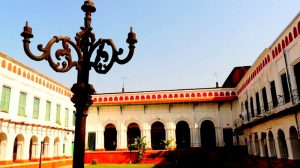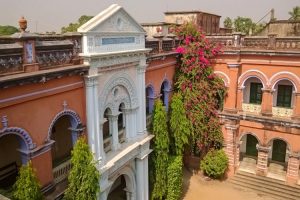| Told by | Dr. Pradip Ghosh |
| Obtained by | Prof. Sanjoy Bandopadhyay and Suranjita Paul |
| Date | 11 July, 2016 |
| Place | SAP-DRS Lab, Sangeet Bhavan, Rabindra Bharati University |
| On Dr. Pradip Ghosh | Dr. Pradip Ghosh is an erudite music scholar and renowned musicologist. |
| Key-words | Shah Suja, Naubat Khan, Misri Sing, Kalowat, 17th century, Kirtan, 1772, 1756, Lord Clive, Mir Jafar, Shobabazar rajbari, Warren Hastings, Bhu Kailash, Mukherjee, Nidhubabu, 1749, 1838, Akhrai gaan, instituions |
| Language | Bengali |
Dr. Pradip Ghosh speaks:
???????? (?????) ?????? ??????? ??? ???? ??? ?????, ???????? ???????? ?? ?? ???????- ???????????, ??????-?? ?? ??????? ??????, ???? ??????? ???? ????? ????? ????? ???? ????? ???? ???????????? ????? ?????? ???? ??? ??????? ??? ??????? ?????? ?????? ??? ???? ?????? string instrument-? ??? pecussion-? ??? ?????-? ????? ??????? ???-?? ??????? ??? ??????? ??????? ???? ???? ?????? ??????- ???? ???? ??????? ??????-? ??? ????????-?? ?? ???? ??? ????- ???? ?????? ?????? ???? ????????, [??????? ???? ?????? ??? ???, ???????? ????? ?????? ?????? ?? ????? ????? ?????? ?????? ??? ?? ??????? ???? ???? ??? ??????? -(?) religious ???????? ?? (?) secular, ?? ???? ???? ?????? ???? ????????, ?? ????? court ?????? ???] ?????? ???? ?????? ??? ????-? ????? ???? ??? musician-?? ??? ???????? ??? ???? ????? ???????? ???? ???? ??? ?? ?????? ??? (??? ??? ??????-?? ??????) ???? ???? ???????, instrumentalist ??, ? ????? ????????
??? ????? ?????? ?????? ???, ???? ?????? ??????????, ?? ??????-? ??????? ?????? ?? ???? ???? ??????????? ?????? ??? ???? ??? ??? ??, ????? ??????-??? ?????? ?????-?? ???? ?????????????? ?????-? ???? ??? ???? ????? ???? ???? ??????????? ????? ?????? ??????? ?????? ??????? ????????-?? ???? ???? ????? ???? ????? ??? ????? ????? ????? ????????? ??? ????? early status ??? classical music-? ????? ??- ??? ????? ?????? ?????? ????? ????? ???? ??, ???? elit society-? ??? ????? ?????? ???????? ???? ????? ???? ???? ?????? ????? ???? ????-??? ???? ??????? ??? ????? ????? ?????—??? ???????? ??-? ???????? ????
???? ????-??? classical music ?????? ???? ?????, ???? ???? ???????? ?????-? ?????? ???????— ??? ????????-?? classical music ???? ????? ?????? ??? ?????? ???? ?????? ???—?? ?? religious music? ???? ???? ????? ?????? ???? ???? ?????? ?????? ??????? ????? ??? ???? ?? ??? ????? ??????? ??????? ????-???????? ??????? ????????? ?????? ???? ?????-?????? ???????? ?? ??????? ?????? ???? ?????? ?????? ??? ????? ???? ????????? ???, ?? ??? ????? ??? ??? ????? ?? ??? ???? ?????? ???????? ????? ???? ????-?? (???????) ??????? ???????? non-working ??? ?????? ????? ????????? ?????? ???????? ?????? revenue-? ??? ??????? ???? ?????? ??? ??????? ????-?? ???? ???- ?????? ??????? ????? ????? ???????? ??? ??????
???? ???? ???? ??? entertainment ??????-?? ??????? ????, ?????? ?? ?? knowledgeable ??? ?? ????

??? ???? ?????? (???????) ??? ?????? ???? ????????? ??? ??????? ???????? ?????? ????? ?????-?? ???? ?? ????????????? ?????? ????? ???????? ????????????, ??? ???? ?? ????? ????? ???????? ????? ???? ????-? ??? ??????? ???????? ???????? ???? ???? ???? ??????? ???? ????, ???? ???? ?????-??? ?????? ???? ???????? ???????? ??? ???????? ??? ????? ?????-?? ????????? ??? ?????? ??? ?? ???? ????-??? (??? ??????) ????? ????????? ???????? ?????? ???; ???? ?????????? ?????-?? ??????????? ?????? ??? supreme power ?????? ?????-?? ?????? ??? ????, ???? ???????? ???? ???? ???? ?????, ??????? native ????????? ????? ???????? ?????? ???, ???????? idle ???? ????, social work-? ??????? ???? ????, ??? ?????? ???? ????? ???? ????-??????? ???? ???? ????
???? ???? (??? ???? ?????) ?????????? ????-? ???? ??? ????-?? ???? ???? ?? ??? ??? ?? ?? ?????? ???? ?????? ???? ?? training center, ?????????-? ?????? ??? ???? musician-??? ? ?????? ???? ?????? ???-?? ??? ??? ???-???? ??? ????? ????? ????? ???? ??? ????? ???-?? ??? ???? ?????? ??? ??????????? ?????? musical instrument ????—?????? ?????-?????? ??, ?? ?????? South India ???? ??????
Verbatim by Mousumi Das
Translation:
I should talk a bit about the kind of music cultivated in Kolkata in earlier times. The kings who resided in parts away from Kolkata, like in Murshidabad, Nadia, etc, got a fair chance to cultivate music. In the Mangal Kavya, we get references of Bisram Khan and other musicians. In those times, string instruments existed parallel to percussions and vocal singers. Bisram Khan was a called an ‘artist’- and in those days, an artist was one who could sing Dhrupad. So where do you think these artists came from? You must remember Shah Suja, the son of Shah Jahan, who came to Bengal as Governor? Suja had brought with him many musicians to his court. Some to name among these musicians are Naobat Khan, Misri Sing (who was also the son in law of Tansen), who could perform the Dhrupad. In this context, let me mention, that the word ‘artist’ (or ‘Kalabanta’) was known colloquially as ‘Kalawant,’ meaning one who could sing in Dhrupad. And those who could do the Khayals were known as ‘Kawal,’ like Basir Khan Kawal. There also existed a division in this. The Religious Kawali, and, the Secular, which was sung in the court and was founded by Amir Khusroe.
Now, we have evidence to prove that Misri Sing, the courtier of Shah Suja had been to Chittagong. The Mughal Empire was almost in its ruins at that time, and thus the courtiers were in a dire need of contingency for their livelihood. At least I believe so. Because where from would you suggest that the Western Kalowats came to Murshidabad or Nadia? I believe that they had come from the court of Shah Suja. This was the early status of classical music – though this kind of music was not available for the common people’s reach. Only the elites of the society, and the Zamindars, who had friendly connections with the Mughals, had access to these musical endeavours. The time I’m talking about is the 17th century.
The Basaks at that time had not yet emerged with their cultivation of classical music. They were at that time, engrossed in Kirtan- but if you want to categorize Kirtans in the realm of classical music, then I have no problems. But this wasn’t Darabari, but was religious music. After this, we know that in 1757, the British overpowered the Mughal in the Battle of Plassey. The British had come to Kolkata before this- to ask for a few rights and possessions in terms of business, which the erstwhile Nawab hadn’t granted them. So the plan of conquering Bengal was at the back of their heads for quite a long time. Soon after this, Lord Clive came to power. He, by his clever words and with the partnership of Mir Zafar, conspired to make the Emperor a puppet. The emperor had the right over the revenue and other such things, while the British took possession of the army. In one way, they were fully equipped to overthrow the Emperor at any time.

When they had money in their pockets, the question of entertainment gets jumbled up- and it doesn’t necessarily always have to be knowledgeable. In those days, Lord Clive (of Kolkata) used to visit the royal family at Shobha bazar. There is also another story of when Clive had hid at this house, to save himself from the bullets of Siraj ud Daullah. Reportedly, after this incident, he had also decided to reward the family. In 1772, when Warren Hastings came to power, he had a lot of cultural accomplishments, which had benefitted the British mostly.
Hastings also used to visit many of the houses to listen to music- be it at the royal family of Shobhabazar, or the residence of Chatu Babu and his family, or be it the family of Bhukailash Mukherjee. Though, the British by that time had established their rule over most parts of India, and on top of that, there were no acting ruler in Delhi, they still brought out a Pension Scheme for the native Zamindars. This resulted in the Zamindars being jobless at the moment, and it also decreased their will for any social work. They thus indulged in amusements of all sorts with the money they got from the British.
Nidhi Babu, (Ram Nidhi Gupta) was born in the year 1841 and died in the year 1839. The prevalent music culture of the time was that of the Akhras. The word Akhra means a training centre, and most of the Baishnavas ha Akhras at their homes, and invited singers to perform there. the Baishnavas and also the musicians had Akhras. The Akhrai songs resembled a classical song, only if you omit the Taan and the Sargam frm the song, and only sing the Khayal. The instruments would be played in between intervals, a system which had been brought from South India.
Translated by: Ankana Das
Picture Courtesy: Google
Edited & Designed: Ms. Rajeswary Ganguly Banerjee
Data processed at SAP-DRS Lab, Department of Instrumental Music, Rabindra Bharati University
